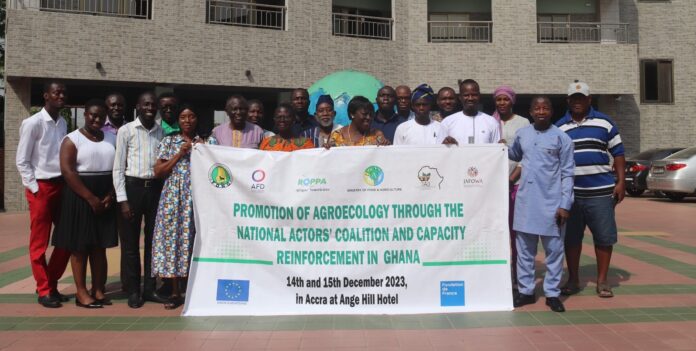Food systems are increasingly impacted by climate variability and change. At the same time, Agriculture through unsustainable practices contributes a third of global greenhouse gas emissions, loss of agricultural biodiversity, environmental pollution, land degradation, and water scarcity resources.
Farmers Organization Network Ghana (FONG), a network of smallholder farmers and fisher-based organizations in Ghana has called on the stakeholders to promote agroecology to reinstate the organic practices of farming for ecological sustainability.
FONG made this call at the 2days workshop with the theme: Promotion of Agroecology through the National Actor’s Coalition and Capacity Reinforcement in Ghana at Angel Hill Hotel, Accra.
The workshop reviewed the annual action plan for the National Consultation Framework on Agroecology in Ghana (NCFA-GH), increasing the awareness of members to reinforce the efficiency of NCFA Ghana. Re-energies NCFA Ghana secretariat and steering committee with the oversight role to implement the action plan.
Speaking to Agric Today, Mr. Kingsley Kwasi Agyemang, the National Correspondent of the ECOWAS Agroecology Program in Ghana, a program implemented by the Ministry of Food and Agriculture-crops services stated that agroecology is geared at tackling the issues surrounding food security, sustainability, climate change, low soil fertility and empowerment to the youth by creating jobs and enhance farmers on their produces and products.
“MOFA is interested in considering resilience against climate change in favor of farmers and reducing greenhouse gas emissions. Agriculture can be a contributor to climate change through sustainable practices and by ensuring that we can increase sustainability without destruction, and this will require several strategies which include the agroecology we are campaigning here”, Mr. Kingsley Kwasi Agyemang said.
He mentioned that FONG Ghana in partnership with Roppa and the ECOWAS agroecology program is to see how the established framework can be strengthened and make the framework visible and impactful. This could be viable only when the action plan in books is being implemented and established.
The action plan has been categorized including capacity building, considering agroecology as mainstream into agricultural sector policies both at the national and sub-regional levels as well as research and development of technologies and innovations for dissemination.
Narrowing the conversation on the impact of the FONG workshop initiative on food security and its resilience in Ghana, he said the causes of food security issues come because of combined factors which may include poor road networks and the inability of the Ghanaian system to be able to regulate the market prices. “To curb this situation, we all must play our role as citizens”, he concluded.
Mr. Nathaniel Sulemana, the National Coordinator for the Farmers Organizations Network Ghana (FONG) added that the farmer coalitions in Ghana need to strengthen the agric sector.
“At the end of the workshop, FONG is expected to reach the objectives, abreast with the charter and the action plan of the coalition. Members must come together to cross-check, consider, and review ideas to build the agroecology environment in Ghana.
Smallholder farmers contribute immensely to Ghana’s food security; therefore, they are the main target in this case. FONG is to engage them and build their capacity on food production to improve their livelihoods in their various communities.
He reiterated that at the end of the workshop, the coalition shall embrace the results in 2024 and beyond concerning the agriculture value chain. Agroecology shall also support the government’s efforts to combat food security issues and its resilience.
In partnership with FONG to make this work Madam Werem Fatoumala Leila, the Programme Assistant of “ROPPA” (Reseau des Organizations Paysannes et Producteurs Agricole) mentioned that in joining hands with FONG on this workshop ROPPA seeks to strengthen the capacities of the coalition. Part of Roppa’s vision for farmers in this exercise, is to educate them, farmers, on quality food production for personal consumption.
This is also to address agricultural, and farmer-related issues and envisions having sustainable agricultural production and marketing in West Africa,
“The coalition supporting smallholder farmers is a booster to the agric sector and requires a collective effort to build that resilience and continuous improvement in the country’s food systems”, Madam Werem Fatoumala Leila opined.
To achieve this, she added stakeholders need to engage actively on the farms and not just give lip service to the youth. The talk must be walked to get the results Ghana needs for the Agric sector since it is one of the biggest sectors that improve the economy.








